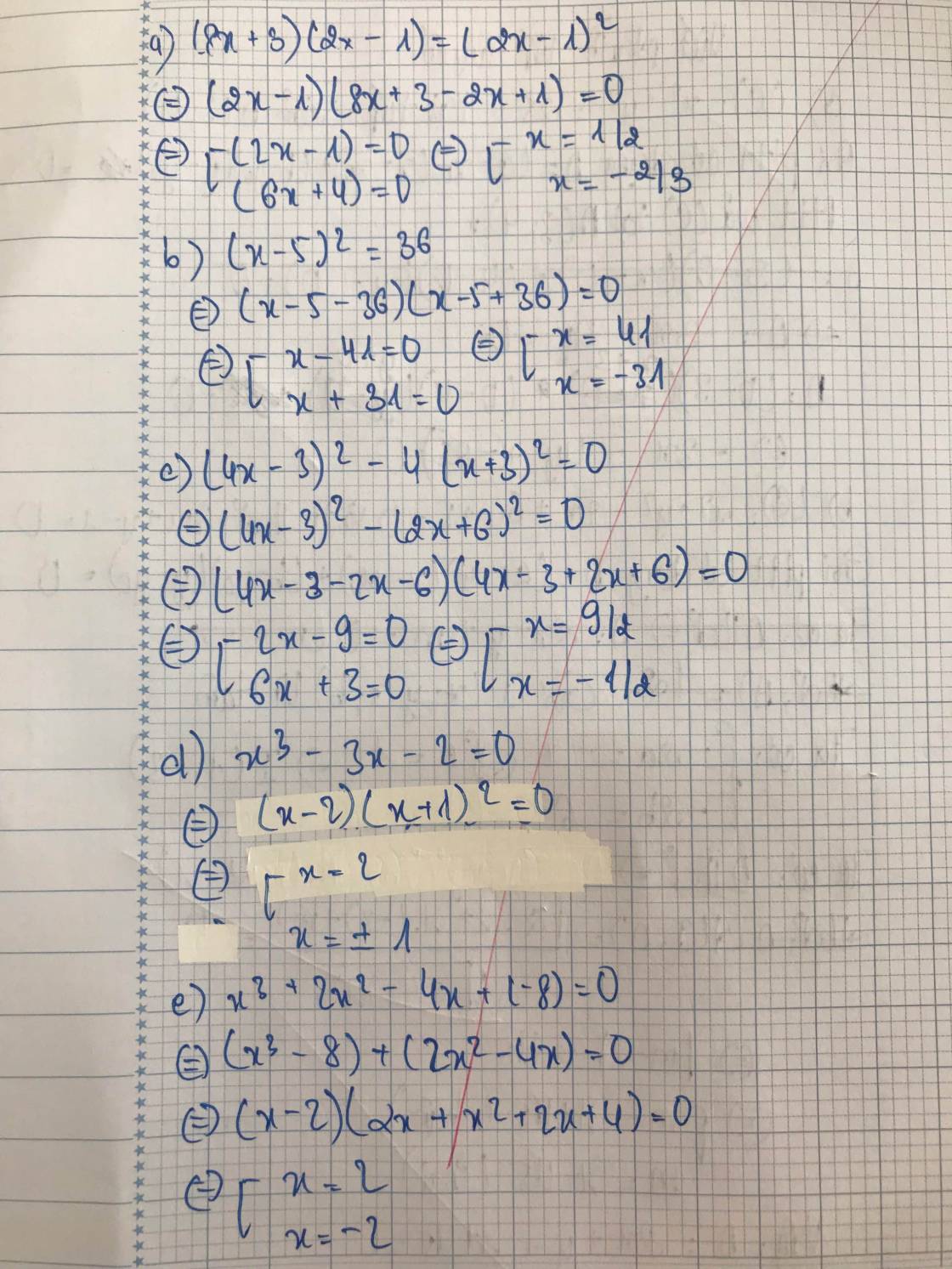x3 + 2 = 3\(\sqrt[3]{3x-2}\)

Những câu hỏi liên quan
1. Cho f(x) và g(x) có đạo hàm trên R. Tính đạo hàm của
a, y=f(x3)-g(x2)
b, y=\(\sqrt{f^3\left(x\right)+g^3\left(x\right)}\)
2. Cho f(x)=\(\dfrac{m-1}{4}\)x4 + \(\dfrac{m-2}{3}\)x3-mx2+3x-1. Giải và biện luận pt: f'(x)=0
1a.
\(y'=3x^2.f'\left(x^3\right)-2x.g'\left(x^2\right)\)
b.
\(y'=\dfrac{3f^2\left(x\right).f'\left(x\right)+3g^2\left(x\right).g'\left(x\right)}{2\sqrt{f^3\left(x\right)+g^3\left(x\right)}}\)
2.
\(f'\left(x\right)=\left(m-1\right)x^3+\left(m-2\right)x^2-2mx+3=0\)
Để ý rằng tổng hệ số của vế trái bằng 1 nên pt luôn có nghiệm \(x=1\), sử dụng lược đồ Hooc-ne ta phân tích được:
\(\Leftrightarrow\left(x-1\right)\left[\left(m-1\right)x^2+\left(2m-3\right)x-3\right]=0\)
\(\Leftrightarrow\left[{}\begin{matrix}x=1\\\left(m-1\right)x^2+\left(2m-3\right)x-3=0\left(1\right)\end{matrix}\right.\)
Xét (1), với \(m=1\Rightarrow x=-3\)
- Với \(m\ne1\Rightarrow\Delta=\left(2m-3\right)^2+12\left(m-1\right)=4m^2-3\)
Nếu \(\left|m\right|< \dfrac{\sqrt{3}}{2}\Rightarrow\) (1) vô nghiệm \(\Rightarrow f'\left(x\right)=0\) có đúng 1 nghiệm
Nếu \(\left|m\right|>\dfrac{\sqrt{3}}{2}\Rightarrow\left(1\right)\) có 2 nghiệm \(\Rightarrow f'\left(x\right)=0\) có 3 nghiệm
Đúng 1
Bình luận (0)
Thực hiện phép chia:a) (
x
3
- 3x - 2) : (x - 2);b) (
x
3
+ 6
x
2
+ 8x - 3): (
x
2
+ 3x -1);c) (2
x
4
– 7
x
3
+ 9
x
2
- 7x + 2): (2
x
2
- 5x + 2).
Đọc tiếp
Thực hiện phép chia:
a) ( x 3 - 3x - 2) : (x - 2);
b) ( x 3 + 6 x 2 + 8x - 3): ( x 2 + 3x -1);
c) (2 x 4 – 7 x 3 + 9 x 2 - 7x + 2): (2 x 2 - 5x + 2).
a) x 2 + 2x + 1. b) x + 3. c) x 2 – x + 1.
Đúng 0
Bình luận (0)
rút gọn A,B,C
A=(3x+7)(2x+3)-(3x-5)(2x+11)
B=(x2-2)(x2+x-1)-x(x3+x2-3x-2)
C=x(x3+x2-3x-2)-(x2-2)(x2+x-1)
\(A=6x^2+23x+21-\left(6x^2+23x-55\right)=76\\ B=x^4+x^3-x^2-2x^2-2x+2-x^4-x^3+3x^2+2x\\ =2\\ C=x^4+x^3-3x^2-2x-\left(x^4+x^3-x^2-2x^2-2x+2\right)\\ =-2\)
Đúng 2
Bình luận (0)
Bài 5: Giải các phương trình sau:a. (3x - 1)2 - (x + 3)2 0b. x3 dfrac{x}{49}c. x2 - 7x + 12 0d. 4x2 - 3x -1 0e. x3 - 2x - 4 0f. x3 + 8x2 + 17x +10 0g. x3 + 3x2 + 6x + 4 0h. x3 - 11x2 + 30x 0
Đọc tiếp
Bài 5: Giải các phương trình sau:
a. (3x - 1)2 - (x + 3)2 = 0
b. x3 = \(\dfrac{x}{49}\)
c. x2 - 7x + 12 = 0
d. 4x2 - 3x -1 = 0
e. x3 - 2x - 4 = 0
f. x3 + 8x2 + 17x +10 = 0
g. x3 + 3x2 + 6x + 4 = 0
h. x3 - 11x2 + 30x = 0
a. (3x - 1)2 - (x + 3)2 = 0
\(\Leftrightarrow\left(3x-1+x+3\right)\left(3x-1-x-3\right)=0\)
\(\Leftrightarrow\left(4x+2\right)\left(2x-4\right)=0\)
\(\Leftrightarrow4x+2=0\) hoặc \(2x-4=0\)
1. \(4x+2=0\Leftrightarrow4x=-2\Leftrightarrow x=-\dfrac{1}{2}\)
2. \(2x-4=0\Leftrightarrow2x=4\Leftrightarrow x=2\)
S=\(\left\{-\dfrac{1}{2};2\right\}\)
Đúng 3
Bình luận (0)
b. \(x^3=\dfrac{x}{49}\)
\(\Leftrightarrow49x^3=x\)
\(\Leftrightarrow49x^3-x=0\)
\(\Leftrightarrow x\left(49x^2-1\right)=0\)
\(\Leftrightarrow x\left(7x+1\right)\left(7x-1\right)=0\)
\(\Leftrightarrow x=0\) hoặc \(7x+1=0\) hoặc \(7x-1=0\)
1. x=0
2. \(7x+1=0\Leftrightarrow7x=-1\Leftrightarrow x=-\dfrac{1}{7}\)
3. \(7x-1=0\Leftrightarrow7x=1\Leftrightarrow x=\dfrac{1}{7}\)
Đúng 2
Bình luận (0)
*Cách khác:
a) Ta có: \(\left(3x-1\right)^2-\left(x+3\right)^2=0\)
\(\Leftrightarrow\left(3x-1\right)^2=\left(x+3\right)^2\)
\(\Leftrightarrow\left[{}\begin{matrix}3x-1=-x-3\\3x-1=x+3\end{matrix}\right.\Leftrightarrow\left[{}\begin{matrix}4x=-2\\2x=4\end{matrix}\right.\Leftrightarrow\left[{}\begin{matrix}x=-\dfrac{1}{2}\\x=2\end{matrix}\right.\)
Vậy: \(S=\left\{-\dfrac{1}{2};2\right\}\)
Đúng 2
Bình luận (0)
Xem thêm câu trả lời
Bài 1 Rút gọn biểu thứca, [(3x - 2)(x + 1) - (2x + 5)(x2 - 1)] : (x + 1)b, (2x + 1)2 - 2(2x + 1)(3 - x) + (3 - x)2c, (x - 1)2 - (x + 1) (x2 - x + 1) - (3x + 1)(1 - 3x)d, (x2 + 1)(x - 3) - (x - 3)(x2 + 3x + 9)e, (3x +2)2 + (3x - 2)2 - 2(3x + 2)(3x - 2) + xBài 2 Phân tích các đa thức sau thành nhân tử1, 3(x + 4) - x2 - 4x2, x2 - xy + x - y3, 4x2 -25 + (2x + 7)(5 - 2x)4, x2 + 4x - y2 + 45, x3 - x2 - x + 16, x3 + x2y - 4x - 4y7, x3 - 3x2 + 1 - 3x8, 2x2 + 3x - 59, x2 - 7xy + 10y210, x3 - 2x2 + x - xy...
Đọc tiếp
Bài 1 Rút gọn biểu thức
a, [(3x - 2)(x + 1) - (2x + 5)(x2 - 1)] : (x + 1)
b, (2x + 1)2 - 2(2x + 1)(3 - x) + (3 - x)2
c, (x - 1)2 - (x + 1) (x2 - x + 1) - (3x + 1)(1 - 3x)
d, (x2 + 1)(x - 3) - (x - 3)(x2 + 3x + 9)
e, (3x +2)2 + (3x - 2)2 - 2(3x + 2)(3x - 2) + x
Bài 2 Phân tích các đa thức sau thành nhân tử
1, 3(x + 4) - x2 - 4x
2, x2 - xy + x - y
3, 4x2 -25 + (2x + 7)(5 - 2x)
4, x2 + 4x - y2 + 4
5, x3 - x2 - x + 1
6, x3 + x2y - 4x - 4y
7, x3 - 3x2 + 1 - 3x
8, 2x2 + 3x - 5
9, x2 - 7xy + 10y2
10, x3 - 2x2 + x - xy2
giải phương trình sau:
a) \(4x^2+\left(8x-4\right).\sqrt{x}-1=3x+2\sqrt{2x^2+5x-3}\)
b) \(8x^3-36x^2+\left(1-3x\right)\sqrt{3x-2}-3\sqrt{3x-2}+63x-32=0\)
c) \(2\sqrt[3]{3x-2}-3\sqrt{6-5x}+16=0\)
d) \(\sqrt[3]{x+6}-2\sqrt{x-1}=4-x^2\)
2(x2-3x+2)= 3√x3+8
ĐK: \(x\ge-2\)
\(2\left(x^2-3x+2\right)=3\sqrt{x^3+8}\)
\(\Leftrightarrow2\left(x^2-3x+2\right)=3\sqrt{\left(x+2\right)\left(x^2-2x+4\right)}\)
Đặt \(\left\{{}\begin{matrix}\sqrt{x+2}=a\\\sqrt{x^2-2x+4}=b\end{matrix}\right.\left(a\ge0,b\ge\sqrt{3}\right)\)
\(pt\Leftrightarrow2\left(b^2-a^2\right)=3ab\)
\(\Leftrightarrow\left(a+2b\right)\left(2a-b\right)=0\)
\(\Leftrightarrow\left[{}\begin{matrix}a=-2b\left(l\right)\\2a=b\end{matrix}\right.\)
\(2a=b\Leftrightarrow2\sqrt{x+2}=\sqrt{x^2-2x+4}\)
\(\Leftrightarrow4x+8=x^2-2x+4\)
\(\Leftrightarrow x^2-6x-4=0\)
\(\Leftrightarrow x=3\pm\sqrt{13}\left(tm\right)\)
Đúng 1
Bình luận (0)
Tìm x biết: a. x3 – 25x 0 b. 3x(x- 2) – x + 2 0 c. x2 – 4x - 5 0 d.x3 – x2 + 3x – 3 0 e. x3 + 27 + ( x + 3)( x – 9) 0
Đọc tiếp
Tìm x biết:
a. x3 – 25x = 0 b. 3x(x- 2) – x + 2 = 0
c. x2 – 4x - 5 = 0 d.x3 – x2 + 3x – 3 = 0
e. x3 + 27 + ( x + 3)( x – 9) = 0
a: \(\Leftrightarrow x\left(x-5\right)\left(x+5\right)=0\)
\(\Leftrightarrow\left[{}\begin{matrix}x=0\\x=5\\x=-5\end{matrix}\right.\)
Đúng 0
Bình luận (0)
Bài 13. Cho 2 đa thức: P(x)= 4x2 + x3 - 2x +3 -x-x3 +3x -2x2
Q(x)= 3x2 - 3x +2 -x3 +2x - x2
b)Tìm đa thức R(x) sao cho P(x) - Q(x) - R(x) =0
`P(x)=\(4x^2+x^3-2x+3-x-x^3+3x-2x^2\)
`= (x^3-x^3)+(4x^2-2x^2)+(-2x-x+3x)+3`
`= 2x^2+3`
`Q(x)=`\(3x^2-3x+2-x^3+2x-x^2\)
`= -x^3+(3x^2-x^2)+(-3x+2x)+2`
`= -x^3+2x^2-x+2`
`P(x)-Q(x)-R(x)=0`
`-> P(X)-Q(x)=R(x)`
`-> R(x)=P(x)-Q(x)`
`-> R(x)=(2x^2+3)-(-x^3+2x^2-x+2)`
`-> R(x)=2x^2+3+x^3-2x^2+x-2`
`= x^3+(2x^2-2x^2)+x+(3-2)`
`= x^3+x+1`
`@`\(\text{dn inactive.}\)
Đúng 1
Bình luận (1)
a: P(x)-Q(x)-R(x)=0
=>R(x)=P(x)-Q(x)
=2x^2+3+x^3-2x^2+x-2
=x^3+x+1
Đúng 1
Bình luận (0)
Bài 1 : giải phương trình
a) (8x + 3)(2x - 1) = (2x - 1)2
b) (x - 5)2 - 36 = 0
c) (4x - 3)2 - 4(x + 3)2
d) x3 - 3x -2 = 0
e) x3 + 2x2 - 4x - 8 = 0




























